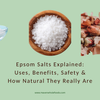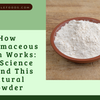5 Plant-Based Protein Sources You Should Know About
- by S R
5 Plant-Based Protein Sources You Should Know About
Introduction
Looking to add more plant-based protein to your diet? Whether you’re vegan, vegetarian, or simply cutting down on meat, getting enough protein from plants is easier than ever. Many vegan protein sources are rich in fibre, vitamins, and minerals — and just as effective for muscle recovery and overall health as animal-based options.
Here are five powerful plant-based protein foods that can help you stay strong, energised, and nourished.
1. Lentils — The Fibre-Filled Protein Superstar
Lentils are one of the best plant-based protein sources, offering about 18 grams of protein per cooked cup. They’re also loaded with fibre, iron, and folate, making them great for heart health and digestion.
- Nutritional benefits: High in protein, fibre, iron, and B vitamins
- How to use: Add lentils to soups, stews, curries, or salads for a filling meal
2. Chickpeas — The Versatile Vegan Protein
Chickpeas (also known as garbanzo beans) pack around 15 grams of protein per cooked cup and are a staple in many plant-based diets. They provide slow-digesting carbs and fibre that help maintain steady energy levels.
- Nutritional benefits: Protein, fiber, folate, and manganese
- How to use: Roast chickpeas for a crispy snack, blend them into hummus, or toss them into salads and curries.
Pro Tip: Use chickpea flour to make protein-rich pancakes or gluten-free baked goods.
3. Quinoa — The Complete Protein Grain
Quinoa is often called a superfood for good reason — it’s one of the few plant-based complete proteins, containing all nine essential amino acids. One cup of cooked quinoa delivers around 8 grams of protein, plus fibre, magnesium, and antioxidants.
- Nutritional benefits: Complete protein, gluten-free, rich in minerals
- How to use: Use quinoa instead of rice, in salads, or as a base for Buddha bowls
4. Tofu and Tempeh — The Soy-Based Powerhouses
Tofu and tempeh are two of the most popular vegan protein foods made from soybeans.
Tofu (soybean curd) absorbs flavour easily, making it perfect for stir-fries, curries, and marinades.Tempeh (fermented soy) offers a nutty taste, firm texture, and 15–20 grams of protein per serving.
- Nutritional benefits: High in protein, calcium, and probiotics (tempeh)
- How to use: Pan-fry tofu for salads or grill tempeh for sandwiches
5. Chia Seeds - Tiny but mighty protein boost
Don’t let their size fool you — chia seeds are a nutrient-dense superfood packed with plant-based protein, fiber, and omega-3 fatty acids. Just 2 tablespoons of chia seeds provide around 5 grams of protein along with calcium, magnesium, and antioxidants.
Nutritional benefits:
- Good source of plant protein and healthy fats
- High in fibre, helping with digestion and fullness
- Naturally gluten-free and rich in essential minerals
How to use:
- Stir chia seeds into smoothies, yogurt, overnight oats or homemade snack bars
- Make chia pudding with almond milk and fruit for a high-protein breakfast
- Sprinkle them on salads or baked goods for added crunch and nutrition
Final Thoughts
Adding more plant-based protein sources to your diet doesn’t just support your health — it’s also better for the planet. With nutrient-rich options like lentils, chickpeas, quinoa, tofu, and chia seeds, you can easily create meals that are delicious, satisfying, and sustainable.
Whether you’re exploring vegan protein foods for fitness or simply aiming for a healthier lifestyle, these five protein-packed plants are the perfect place to start.
- Posted in:
- chia seeds
- chickpeas
- Healthy Eating
- healthy grains
- healthy lifestyle
- helathy living
- High Fibre
- High Protein
- letnils
- plant based
- protein dense
- protein packed
- protein sources
- quinoa
- salads
- vegan protein sources
- vegan smoothies





